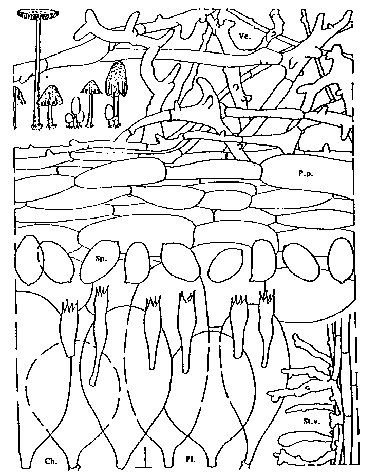Macroscopic features |
Pileus 5-12 x 4-9 mm when still closed, up to 20 mm when expanded, first ellipsoid, ovoid or conical, white, soon greyish. Veil white, breaking up in small, radial, hairy-fibrillose scales. Lamellae, L = 23-26, l = 0-3, rather crowded, free, first white, then grey-brown to blackish. Stipe up to 40 x 1-1.5 mm, white, greyish white, minutely white floccose, in particular at clavate base. |
Microscopic features |
Spores [140,6,4] 7.0-9.8(-10.7) x 4.6-6.2(-6.9) µm, oblong, sometimes ellipsoid or ovoid with rounded apex, rather pale (dirty) red-brown and central, c. 1.3 µm wide germ pore; Q = 1.45-1.90, av. Q = 1.55-1.70; av. L = 8.4-9.1, av. B = 5.0-5.6 µm. Basidia 18-40 x 7-9 µm, 4-spored, surrounded by (3-)4-5(-6) pseudoparaphyses. Pleurocystidia 60-100 x 35-50 µm, broadly cylindrical or oblong to ellipsoid. Cheilocystidia 30-80 x 20-50 µm, (sub)globose to ellipsoid, oblong or obovoid, sometimes subutriform or subcylindrical. Elements of veil thin-walled, diverticulate, 3-10(-15) µm wide; excrescences up to c. 15 µm in length. Clamp-connections present. |
Habitat & distribution |
In small groups, a few together on dead wood (Acer and Populus), very rare. Only known from a few localities in the Netherlands and Germany. |
Remarks |
Coprinus goudensis can easily be recognized by the ellipsoid spores which in average are less than 10 µm long, having an average quotient of 1.6 or more, and the lignicolous habitat. |

[Copyright © by ]